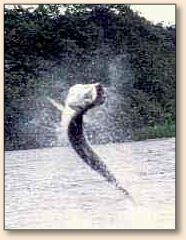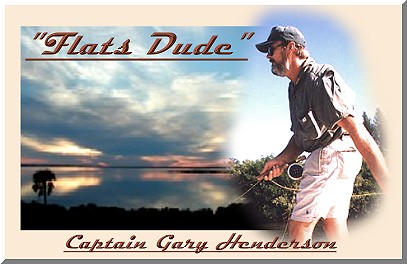|
Last year at this time, I was planning a trip to
Florida's west coast to fish with a group I had met
on FAOL's site. Four of whom I already had met face
to face a few months prior; four guys that I was
looking forward to seeing again to swap stories,
sharing laughter and just plain old catchin' up.
Harold Hattaway, Stev Lenon, Ed Mercado, Bill Sorbie
and I fished Tampa Bay's Sunshine Skyway Bridge flats,
and believe me, there was a lot more shootin' the breeze
than fishin'.
Today, my mind is on the return trip to the west coast
to do it all over again at the FAOL Florida Fish-In '06,
this time a little further south of Tampa Bay. This time
in the Charlotte Harbor area.

I'm fairly familiar with the west coast of Florida. I
practically spent my formative years there, and through
my love of this area, I have traveled many times back to
what I consider my "other" home waters. In my opinion,
it's simply the most beautiful coastal location in my
home state.

Blinding white, quartz sand beaches, swaying tropical palms,
dark and secluded mangrove keys where rusty-colored raccoons
prowl the many oyster bars, are just some of the magnificence
one will discover there. But let us not forget the monsters
that inhabit these blue-emerald waters, or the thunder of
the crashing snook in the back country's brackish waters,
hidden from your sight, but echoing from just around that
bend, sending shivers down your spine. Hideaways among the
keys where the mighty silver king, the tarpon, will cause
the most seasoned angler's heart to stop, then race, and
the very life-giving breath will freeze in your throat as
he blows up on your fly that you now realize is attached
to a rod far too small. He smashes the small, 1/0 fly,
jumps fully into the air rattling his massive gill plates,
showering silvery salt spray. Then all is quiet...he's gone,
and you will never forget that very moment when you went
bear hunting with a .22.
In the stillness of a small cutout between two sharp oyster
bars, six redfish tail up as they feed on small crustaceans
they have uprooted from the eel grass, appearing as butterfly
wings sitting on the water's film. Your heart begins another
workout as your pulse speeds up. You try to control it, but
that's useless. Your hands can't feel the fly-line and an
unfamiliar ringing in your ears begins. The cast is just
shy of the school, and you pick your line up in midair.
The tails disappear just below the surface, but they
didn't "spook." Your fly lands just past the fish and
you pray to the fish gods for this to work as you
short-strip the fly. A submarine-sized wake comes up
and follows closely behind the fly. He charges and damned
near snatches the rod from your shaking hand. The brightly
colored line hisses as it follows the big red out past the
oysters then out into the backing of your screaming reel.
Just as you think you have him under control, he turns
and repeats the blistering run, but this time he travels
between the two bars and cuts the mono leader on the sharp
edges of the shells. He's been feeding where he grew up,
and you know he just played you. After all, it's his
territory, not yours.

The above scenarios aren't made up. They are, in fact,
all of my experiences in these southwest Florida waters.
Venice, Charlotte Harbor, Englewood, Lemon Bay, Manasota
Key, Don Pedro Island all share in the same characteristics.
After all, this is the area where the early Spanish explorers,
the likes of Panfilo de Narvaez and Cabeza de Vaca, came
ashore back in 1528 to colonize the area after the discovery
by Ponce de Leon in 1513. But the "discovery" of the area
wasn't de Leon's to actually claim. The Indians were there
first and defended their homeland with force, fatally
wounding the Spaniard in 1521.
The history of this area can still be heard echoing through
the ancient trees and beaches, but far too many tourists
have visited without realizing the sands on which they
walk were, in deed, the same sands that saw tall, wooden
sailing ships that delivered diseases and armored strangers
that changed the landscape and the culture of the Native
Americans forever. More about this area can be read in my
archives entitled, "Englewood, Lemon Bay and Stump Pass."

On March 2nd, 2006, a group of fly anglers will converge
on strips of sand and waters to discover. They will,
perhaps for the first time, discover new friends that were
merely typed names on a website called "Fly Anglers On Line."
They will discover new sights and sounds and smells that will
create memories that will be theirs forever. And, without
a doubt, they will share our waters of discovery.
'Til next time. ~ Capt. Gary
About Gary:
Gary grew up in central Florida and spent much
of his youth fishing the lakes that dot the area.
After moving a little closer to the coast, his
interests changed from fresh to salt. Gary still
visits his "roots" in the "lake behind the house."
He obtained his captain's license in the early '90's
and fished the blue waters of the Atlantic for a little
over twelve years. His interests in the beautiful shallow
water flats in and around the famous Mosquito Lagoon came
around twenty-five years ago. Even though Captain Gary
doesn't professionally guide anymore, his respect of the
waters will ever be present.
Gary began fly fishing and tying mostly saltwater
patterns in the early '90's and has participated as
a demo fly tier for the Federation of Fly Fishers
on numerous occasions. He is a private fly casting
and tying instructor and stained glass artist,
creating mostly saltwater game fish in glass.
|





